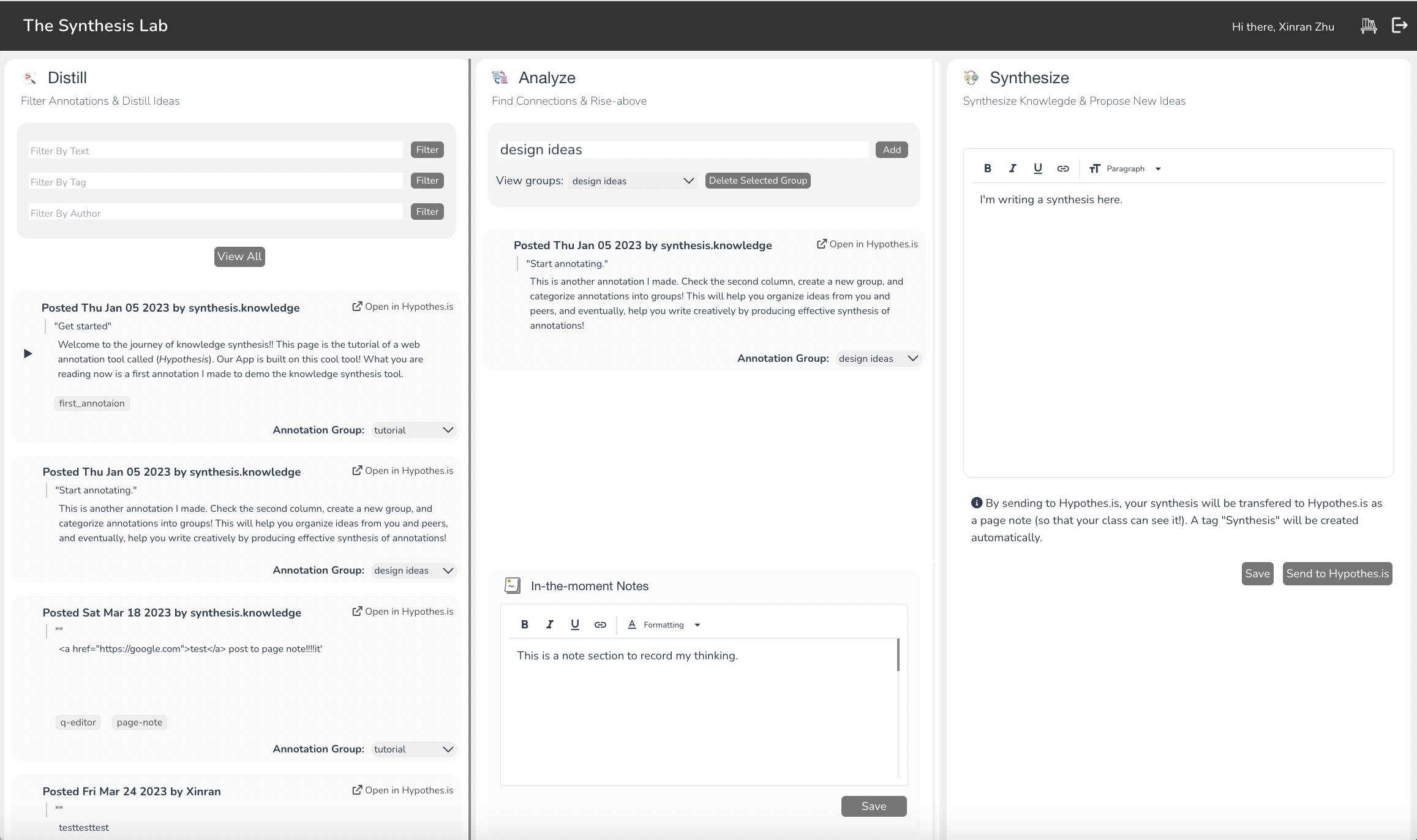Updated on May 12, 2023
The Synthesis Lab
Learning through collaboration in digital spaces remains a challenge for learners – it requires them to grapple with often complex ideas
that trigger wide-ranging perspectives from their peers. Meanwhile, they often need to navigate
a large amount of fragmentary information across multiple sources to maintain effective conversations. Given the
intricacies, knowledge synthesis is one of the key constructs that facilitates the transition from “knowledge sharing” to a
higher-level learning in collaborative learning (Van Aalst, 2009; Scardamalia & Bereiter, 2014).
How can we support knowledge synthesis?
As mentioned earlier, synthesizing knowledge in collaborative learning is a complex endeavor, and it needs supports. Therefore, we designed the Synthesis Lab - to provide an interactive space to spark collaboration and deep learning.
The Synthesis Lab retrieves students’ discourse data from a web-annotation technology – Hypothes.is via its APIs. Drawing inspiration from previous designs (e.g., Chan, 2021; Hahn et al., 2016) and incorporating insights from interdisciplinary literature (e.g., Ackerman et al., 2013; Bloom et al., 1956; DeSchryver, 2014; Morabito & Chan, 2021; Robert et al., 2008), The Synthesis Lab offers a structural framework to helps deconstruct the complex synthesis-making process into smaller building blocks and guides students through the key steps, including distilling, connecting, analyzing, rising above, and aggregating ideas generated from the discourse. These steps guide students to discover the interrelationship between peers’ posts other than the simply reply relationships, which leads to further rising above previous ideas and constructing coherent knowledge out of fragmentary information. The production of the syntheses can be used to further connect with other learning events, such as writing assignments and in-class live discussions.
Try The Synthesis Lab at: https://h-synthesizer.web.app/.
Tutorial: https://drive.google.com/file/d/1DskypRQT-itHNTaYfOKusy2W7FibVxjB/view?usp=sharing
Recent Publication:
What is knowledge synthesis?
Knowledge synthesis is one important form of cognition in human learning and collaboration. It involves skillfully and strategically weaving together diverse strands of information to foster conceptual innovation, generate novel knowledge, and design creative solutions (Deschryver, 2014; Morabito & Chan, 2021; Nonaka, 1991; Qian et al., 2020). In contrast to other cognitive processes such as interpreting and summarizing information, synthesis-making involves rising above current levels of explanation which results in understanding phenomena on a higher plane and the creation of new concepts (van Aalst, 2009; Scardamalia & Bereiter, 2014). It has been referred to as the “transdisciplinary skill,” encapsulating the way creative thinkers transcend traditional disciplinary boundaries (Henriksen, 2018).How can we support knowledge synthesis?
As mentioned earlier, synthesizing knowledge in collaborative learning is a complex endeavor, and it needs supports. Therefore, we designed the Synthesis Lab - to provide an interactive space to spark collaboration and deep learning.
The Synthesis Lab retrieves students’ discourse data from a web-annotation technology – Hypothes.is via its APIs. Drawing inspiration from previous designs (e.g., Chan, 2021; Hahn et al., 2016) and incorporating insights from interdisciplinary literature (e.g., Ackerman et al., 2013; Bloom et al., 1956; DeSchryver, 2014; Morabito & Chan, 2021; Robert et al., 2008), The Synthesis Lab offers a structural framework to helps deconstruct the complex synthesis-making process into smaller building blocks and guides students through the key steps, including distilling, connecting, analyzing, rising above, and aggregating ideas generated from the discourse. These steps guide students to discover the interrelationship between peers’ posts other than the simply reply relationships, which leads to further rising above previous ideas and constructing coherent knowledge out of fragmentary information. The production of the syntheses can be used to further connect with other learning events, such as writing assignments and in-class live discussions.
Try The Synthesis Lab at: https://h-synthesizer.web.app/.
Tutorial: https://drive.google.com/file/d/1DskypRQT-itHNTaYfOKusy2W7FibVxjB/view?usp=sharing
Recent Publication:
Zhu, X., Shui, H., & Chen, B. (2023). The Synthesis Lab: Empowering collaborative learning in higher education through knowledge synthesis. Proceedings of Computer Supported Cooperative Work and Social Computing (CSCW’23 Companion) (pp. 245-248).

Ongong deisgn note:
